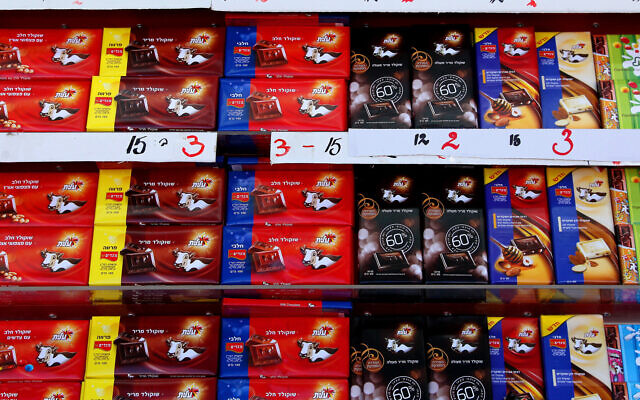Israel’s competition watchdog is planning to file indictments against the Strauss Group, one of the country’s largest food product manufacturers, on suspicion of attempting to coordinate price increases.
The Israel Competition Authority on Monday summoned Strauss, its former CEO Giora Bardea, and its chief financial officer Ariel Chetrit to a hearing, which must take place before filing indictments against them over allegations that they were engaged in attempts to coordinate price increases through public statements.
According to the hearing documents, Strauss allegedly informed its competitors that it was considering raising prices in an attempt to reach a restrictive arrangement with them on price hikes.
The Israeli watchdog found that in its financial statement release for the first quarter of 2021, Strauss publicly announced that in light of the increases in the prices of some raw materials and sea transportation costs, it is preparing for various options, and in some cases will consider updating prices.
Israel’s second-largest food and beverage group in terms of sales volumes also issued a press release announcing that it was monitoring the effects of rising input prices and examining plans and methods of action, including pricing policy.
“This was accompanied by additional public messages in which Strauss announced that it was considering raising prices and had not yet made a decision,” the Israel Competition Authority said in a statement. “These public messages were floated despite the fact that there was no real discussion in the company about the move to raise prices.”
Strauss allegedly used the public financial statements, the press release and additional messages as a so-called “trial balloon aimed at signaling to the major food suppliers, and in particular to its competitors, of its desire to reach an arrangement to raise prices.” The aim of the conduct is that food suppliers understand the messages and raise the prices of their products accordingly.
“Therefore, Strauss is suspected of trying to reach a restrictive agreement on price hikes,” it was added.
The trial balloon tactic is used to put out ideas or information to gauge reactions of the target audience. As such, Strauss is alleged to have informed major food suppliers of its prospective or potential plans to raise prices which, if proven, is conduct tantamount to coordinating hikes.
Strauss said in an emailed statement that the food and beverage conglomerate believes there was “no flaw in the conduct of the company and its officers who acted as expected of them in conjunction with legal advice provided.”
“We are confident that after the company and the officers present their case, an informed decision will be made regarding the closing of the case,” the statement read.
The Israel Competition Authority said that the hearing notice follows a complex investigation into suspicions of offenses related to the conduct of coordinating restrictive arrangements or the attempt of forming a cartel through public statements between suppliers and retailers in the food market, which is a violation of the Competition Law.
The watchdog pointed out that the field of supply, marketing and distribution of food products in Israel is highly concentrated, and a small number of suppliers with a large market share control a considerable part of the market. Strauss is one of the largest food suppliers in Israel with a monopoly in certain areas of the food sector, the watchdog added.
The investigation goes back to 2021, when the Israel Competition Authority raided the offices of Shufersal, the country’s largest supermarket chain, as well as Strauss, and interrogated senior officials of major food suppliers and retailers on suspicion of price fixing.
Listed on the Tel Aviv Stock Exchange with a market cap of about NIS 9.8 billion ($2.6 billion), Strauss generated over NIS 9.5 billion in total annual revenue in 2022 and employs about 18,160 people worldwide, including 6,000 in Israel, at about 28 manufacturing sites.
Consumer prices and costs for raw materials have ballooned worldwide over the past two years due to a series of factors, including supply chain issues stemming from the COVID pandemic and Russia’s invasion of Ukraine. The rise in costs has also trickled to Israeli manufacturers and suppliers, hiking the prices of food and other basic items including housing and electricity.
Food prices in Israel have risen 50% over the past two decades and are 25%-80% above the OECD average, with dairy products, soft drinks, and grain-based products particularly expensive (as of 2017 data, according to the OECD).
In the food retail sector, the top three supermarket chains account for over half of the Israeli market, limiting competition and putting upward pressure on prices. Meanwhile, import tariffs, regulatory bottlenecks, value-added tax costs and kosher restrictions have been keeping out international retail chains.
Earlier this year, French supermarket chain Carrefour entered the Israeli market, with observers hoping the move will spur much desired competition in Israel’s overly concentrated food retail market to help bring down the rising cost of living.
Since the start of the year, the government has faced widespread criticism that it is not dealing with the ever-growing cost of living crisis, and is instead focusing on its controversial plans to overhaul the judiciary.
from "price" - Google News https://ift.tt/jBAfI6Q
via IFTTT

No comments:
Post a Comment